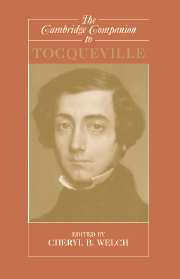Book contents
- Frontmatter
- Introduction: Tocqueville in the Twenty-First Century
- 1 Tocqueville’s Comparative Perspectives
- 2 Tocqueville on 1789: Preconditions, Precipitants, and Triggers
- 3 Tocqueville’s New Political Science
- 4 Tocqueville, Political Philosopher
- 5 Tocqueville’s Democracy in America Reconsidered
- 6 Translating Tocqueville: The Constraints of Classicism
- 7 The Writer Engagé: Tocqueville and Political Rhetoric
- 8 The Shifting Puzzles of Tocqueville’s The Old Regime and the Revolution
- 9 Tocqueville and Civil Society
- 10 Tocqueville on Threats to Liberty in Democracies
- 11 Tocqueville on Democratic Religious Experience
- 12 Tocqueville on Fraternity and Fratricide
- 13 Tocqueville and the French
- 14 Tocqueville and the Americans: Democracy in America as Read in Nineteenth-Century America
- Bibliography
- Index
- Series List
12 - Tocqueville on Fraternity and Fratricide
Published online by Cambridge University Press: 28 January 2007
- Frontmatter
- Introduction: Tocqueville in the Twenty-First Century
- 1 Tocqueville’s Comparative Perspectives
- 2 Tocqueville on 1789: Preconditions, Precipitants, and Triggers
- 3 Tocqueville’s New Political Science
- 4 Tocqueville, Political Philosopher
- 5 Tocqueville’s Democracy in America Reconsidered
- 6 Translating Tocqueville: The Constraints of Classicism
- 7 The Writer Engagé: Tocqueville and Political Rhetoric
- 8 The Shifting Puzzles of Tocqueville’s The Old Regime and the Revolution
- 9 Tocqueville and Civil Society
- 10 Tocqueville on Threats to Liberty in Democracies
- 11 Tocqueville on Democratic Religious Experience
- 12 Tocqueville on Fraternity and Fratricide
- 13 Tocqueville and the French
- 14 Tocqueville and the Americans: Democracy in America as Read in Nineteenth-Century America
- Bibliography
- Index
- Series List
Summary
Near the end of his classic essay ''Two Concepts of Liberty,'' Isaiah Berlin struggled to deal with a verbal confusion that allegedly confounded negative liberty not with his famous concept of positive liberty but with ''her sisters, equality and fraternity.'' These, Berlin argued, are less matters of freedom than of status. For example, when members of groups denied both freedom and respect long for the emancipation of their entire nation or race or religious brotherhood, they often confuse liberty with the recognition of fraternity. Such longings, however labeled, are certainly no less explosive in the twenty-first century than they were fifty years ago. I read Tocqueville - interpreted by Berlin as well as many others primarily as a brilliant theorist of the tensions between liberty and equality - for insight into the perplexing relationship between liberty and fraternity. Here, as elsewhere, his struggles for clarity about democracy's contrary tendencies, his ambivalence, and his uneasy compromises in some ways mirror our own.
Tocqueville believed and feared that the modern world was moving not only toward equality but toward sameness – that “variety [was] vanishing from the human species.” Hence the distinctive ties that bind particular peoples called for analysis and evaluation. We see his attention to such ties not only in Democracy in America – with its seminal treatment of the different fates of Europeans, Africans, and Amerindians in the New World – but also in his political writings on European colonial slavery, imperial conquest, and the nationality question within Europe.
- Type
- Chapter
- Information
- The Cambridge Companion to Tocqueville , pp. 303 - 336Publisher: Cambridge University PressPrint publication year: 2006
- 5
- Cited by

